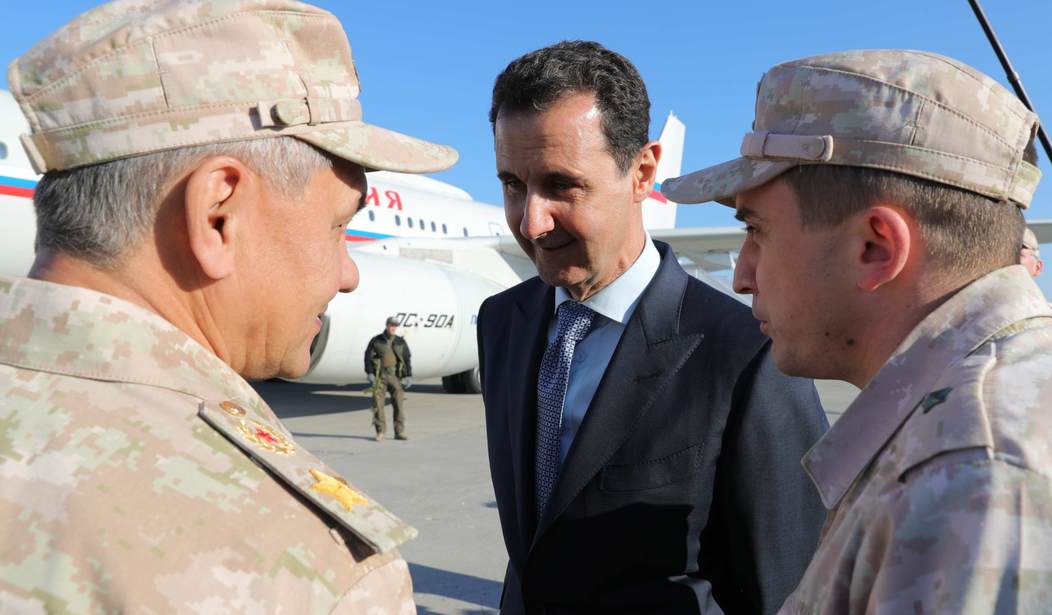President Trump’s withdrawal of 2,000 U.S. Special Forces from Syria elicited a chorus of self-righteous denunciations from the foreign policy Establishment, as well as expressions of concern from his supporters. Coming from the neo-conservatives, that is chutzpah, a Yiddish-Aramaic word that connotes unmitigated gall. It was the neo-cons, not Trump, who created the present mess in Syria that Trump must address as best he can.
Trump’s impulsiveness serves him well on many occasions, but this was not one of them. It humiliated not only Defense Secretary Mattis but also National Security Adviser John Bolton, who stated clearly that U.S. troops would stay in Syria until Iran leaves. Not just the decision to remove troops, but the sudden turnaround in U.S. policy, hurts U.S. credibility. Israeli Maj. Gen. Yaakov Amidror, a former national security adviser to PM Netanyahu, commented:
Another issue is US credibility. Alas, the US president is following the path of his predecessor, who explained that “credibility” has no importance. In my opinion, both Obama and Trump are mistaken. A superpower without credibility loses part of its capabilities. The US, which is abandoning the Kurds to their fate and exposing them to the revenge of the Turks, the Syrians and perhaps even the Iranians, will be perceived in the region as having lost credibility. The US will be viewed as abandoning its allies, and therefore in future potential allies will think twice about relying on and partnering with the US.
In my opinion, it will soon be evident in more than a few countries that they feel stabbed in the back by the US. The first to feel this backlash will be Jordan, which is also the closest to the frontlines and will now be directly facing the Iranians.
America has no stronger or more vocal ally than Gen. Amidror. When our best friends admonish us for actions against our own interest, we should listen. There is a reasonable case to remove American troops, but the way it was done maximized damage.
That said, the troop withdrawal offers advantages to our allies as well as disadvantages. Gen. Amidror observed that Iran will indeed achieve its goal of creating a land corridor to the Mediterranean, but added:
From Israel’s point of view, there are two possible benefits arising from the President’s decision. Once the US has left the region, there will be one less player that Israel must consider when planning its operations in Syria. In general, an equation with fewer variables is easier to understand and deal with. Without the Americans, whose interests had to be considered in every operation, the decision-making process in Israel will be simplified. And the US will no longer constrain Israel’s operations. The US withdrawal gives Israel almost complete freedom of action.
The withdrawal of the US leaves Israel as the strongest and most stable country in the region and the only serious player with which the main Arab countries can cooperate in the confrontation with Iran and ISIS. The extent to which Israel’s position is strengthened as a result of the vacuum left by the Americans is difficult to assess, but the potential is significant.
The estimable Caroline Glick points to another positive feature of Trump’s decision. Israel, she argued, will have a freer hand to deal with the Lebanese government, a de facto ally of Hezbollah and Iran which the U.S. until now has treated as an American ally.
I do not believe that Trump took the best course of action, but his frustration at the Syrian quagmire is understandable. The bipartisan Establishment created the mess from which Trump is trying to extricate American forces.
In 2011, the Obama Administration and the Republican Establishment fell over each other in their enthusiasm for the so-called Arab Spring. The overthrow of Egyptian President Hosni Mubarak and a rebellion against Syrian dictator Bashar Assad, both sides believed, would inaugurate a new era of democracy in the Middle East. The Bush Administration had imposed majority, that is, Shi’ite sectarian, rule on Iraq, turning Iraq into an Iranian ally and leaving Iraq’s Sunni minority without state protection. Gen. David Petraeus solved the problem in the short-term by putting Sunni fighters on the American payroll.
The Arab Spring was the second stupidest idea ever to make it to prime time in the history of American foreign policy (the stupidest was nation-building in Iraq and Afghanistan). Instead, Egypt briefly got a Muslim Brotherhood government, and teetered on the brink of starvation until more than 30 million Egyptians took to the streets in protest and made Gen. al-Sisi president by acclamation. Syria got a civil war that displaced about half its population of 22 million, producing among other things the refugee wave that swamped Europe in 2015. The Sunnis whom Petraeus funded and armed during the 2009-2010 “surge” drifted towards ISIS, as Lt. Gen. Michael Flynn warned in a now-famous 2012 Defense Intelligence Agency report. That got Flynn fired twice, once by Obama, and again by the Washington swamp, which entrapped him after newly elected President Trump made him national security adviser.
Syria and Iraq (as I allowed the ghost of Cardinal Richelieu explain in a 2012 romp) had been stable for decades:
“It is a simple exercise in logique. You had two Ba’athist states, one in Iraq and one in Syria. Both were ruled by minorities. The Assad family came from the Alawite minority Syria and oppressed the Sunnis, while Saddam Hussein came from the Sunni minority in Iraq and oppressed the Shi’ites.
It is a matter of calculation – what today you would call game theory. If you compose a state from antagonistic elements to begin with, the rulers must come from one of the minorities. All the minorities will then feel safe, and the majority knows that there is a limit to how badly a minority can oppress a majority. That is why the Ba’ath Party regimes in Iraq and Syria – tyrannies founded on the same principle – were mirror images of each other.”
“What happens if the majority rules?,” I asked.
“The moment you introduce majority rule in the tribal world,” the cardinal replied, “you destroy the natural equilibrium of oppression. The minorities have no recourse but to fight, perhaps to the death.”
The meddling, bungling nation-builders of Washington took countries where only a few hundred unfortunate souls had their fingernails pulled out in secret police dungeons each year, and turned them into slaughterhouses. Russia intervened first of all because it could, and secondly because the Sunni jihad against the Assad government drew in thousands of Russian Muslim terrorists from the Caucasus and threatened to metastasize back into Russia. Iran poured its own Revolutionary Guards and an additional 80,000 Shi’ite militiamen from Lebanon, Pakistan and Afghanistan. Ten million Syrian Sunnis were driven from their homes, and Iran now seeks to replace many of them with Shi’ite settlers.
In other words, the Kristol-Krauthammer-McCain wing of the Republican Party handed Russia and Iran the opportunity of the century. Behind Russia and Iran lurks the specter of China. I raised the possibility of a “Pax Sinica in the Middle East” five years ago, and I fear that it is slowly coming into view. America cannot simply slap down Turkey, a troublemaker in Syria, because Turkey can turn to China. All the combinations are impossibly complicated, but none of them are benign from an American standpoint.
America’s minuscule military presence in Syria had limited value for maneuvering on the ground (it helped to keep the Kurds in play against the Turks and the Iranians), but its value was largely symbolic. That by itself was important, as Gen. Amidror emphasizes. None of the choices before President Trump was good, thanks to the chronic malfeasance of the foreign policy Establishment, and it is chutzpah to denounce him because the bad choice he made was not the least bad.
My often-stated view is that the U.S. needs to step back from playing whack-a-mole with current problems and concentrate on restoring our technological edge.
Russia’s influence in Syria arises in large part from the fact that its S-400 air defense system is the world’s best. We know in theory how to defeat it but haven’t spent the money to develop working countermeasures. That is the real scandal. For the time being, though, President Trump has raised the probability of a major war on Israel’s northern borders with Lebanon and Syria.










Join the conversation as a VIP Member